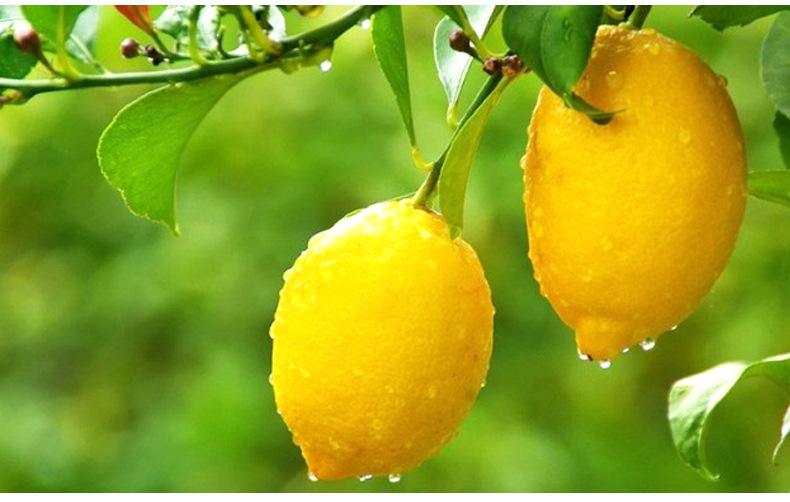(单词翻译:单击)
听力文本
Now, the VOA Learning English program Words and Their Stories.
There are several kinds of citrus fruit. The most common are limes, oranges, grapefruit, tangerines and lemons.
Out of all of them, it is the lemon that has found its way into a number of English language expressions.
While eating an orange or grapefruit can be pleasant, we don't usually eat plain lemons. Lemons are really sour. The acid in them makes it really hard to eat them raw. Lemons are so acidic they can actually take the protective enamel off your teeth.

So, biting into a lemon does not bring a smile to your face. In fact, when someone is unhappy she may have a puckered look on her face. In this case we can say she looks as if she just sucked on a lemon. We can also call this person a sourpuss. This is a person who always complains and always looks unhappy.
With its really sour taste, sucking on a lemon is unpleasant. So, telling someone to "Go suck a lemon!" is a way of showing your anger. It's not really nice and sounds childish. But there are worse things you could say!
While we don't usually eat lemons raw, they can add taste and vitamin C to food and drinks. But in everyday speech, the word "lemon" usually represents something poor, bad or broken.
For example, if you hand someone a lemon, you have given them something that is broken or doesn't work. This expression means that you have cheated them. A "lemon" can also mean an unsatisfactory answer.
As we said, a lemon can be something you bought that does not work. It is defective. Americans often use the word lemon to describe a newly-bought, but defective vehicle.
Let's say you go to an automotive dealership and buy what you think is a good car. On the streets around the dealership, it runs perfectly. But on the drive home, everything goes wrong. The gas pedal sticks. The engine starts smoking. Then it just stops running in the middle of the road!
You have bought a lemon.
As you watch the tow truck take away the car for repairs, you call the dealership and demand your money back. The salesman says with a laugh, "No way! All sales are final!"
Now, many people would get angry. Not only do you not have a car, but you have lost a lot of money. But you don't get upset. You find a way to make this situation work for you.
After all, you are a person who looks on the bright side. Your life's belief is: When life give you lemons, you make lemonade!
Here, the term "lemon" means a problem or difficulty in life. Lemonade is a cool refreshing drink. You could say it is the prize you get by overcoming difficulty with your good attitude.
So, we use this expression to describe a situation where something goes wrong but the person in the situation chooses to turn it into a positive experience. People who turn lemons into lemonade we call optimistic. They have a can-do attitude!
This is a common phrase and we use in many different situations. Sometimes we don't even need to say the whole thing. If you simply say, "When life gives you lemons ..." people will know what you mean.
So, back to our broken car story. You take the lemon of a car you bought at the dealership and you make lemonade.
First, you learn about your rights as a buyer under a measure known as the lemon law. In the United States, this requires an automobile manufacturer or dealer to replace, repair, or refund the cost of an automobile that proves to be defective after purchase.
Under the lemon law, you will get your money back. But don't stop there. Why make a glass of lemonade when you can make a whole pitcher!
You warn friends and neighbors about that car dealership. You write an article for the local newspaper about lemon laws. The newspaper receives many emails and letters from people who had similar experiences. Knowing their rights, they also demand their money back for the lemons that were sold to them. The newspaper is so happy with the amount of responses that it offers you a part-time job writing stories about consumer issues.
You've turned a bad experience into something good and you've helped others. Life gave you lemons and you made lemonade.
And that's the end of this week's Words and Their Stories.
I'm Anna Matteo.
Have you ever had to make lemonade from the lemons life gave you? Or do you have a similar expression in your language? Let us know in the Comments Section.
重点解析
1.hand someone a lemon 欺骗某人;把不值钱的东西卖给某人
They tried to hand me a lemon.
他们想把那蹩脚货给我。
2. get upset 感到不安;生气;伤心
You don't get upset and would not even give it a second thought.
你不会心烦,甚至都不会对它左思右想。
3.have a can-do attitude 乐观一点
My staff must have a can-do attitude.
我的员工须具备乐观进取的态度。
参考译文
现在是VOA学英语《词汇掌故》节目时间。
有好几种水果属于柑桔类。最常见的有酸橙(limes)、橙子(oranges)、葡萄柚(grapefruit)、橘子(tangerines)和柠檬(lemons)。
在所有这些水果之中,柠檬融入到了大量的英语表达里。
虽然吃橙子或者葡萄柚是一件令人愉快的事情,但一般我们不直接吃柠檬。柠檬真得很酸。这种酸让人真得很难直接下口。实际上柠檬酸到可以把你牙齿上具有保护性质的珐琅质去除掉。
因此,咬一口柠檬不会让你的脸上露出笑容。实际上,当一个人不开心的时候,她的脸会皱起来。这种情况下,我们可以说这个人看起来像是刚吸了口柠檬汁。我们也可以称呼这种人为“满腹牢骚的人(sourpuss)”。这种人爱抱怨且总是看起来不开心。
由于柠檬浓酸的口味,因此吸一口柠檬是令人很不愉快的事。所以,对某人说“Go suck a lemon!(走开)”是表达你的愤怒的一种方式。这种行为很不友善,而且听起来很幼稚。但你还有更糟糕的事情可以说!
虽然我们不经常直接吃柠檬,但柠檬可以给食物和饮品调味且能提供维他命C。然而在日常交际中,单词“lemon”往往代指劣质、不好的或者坏了的事物。
例如,如果你“把瞥脚东西给某人(hand someone a lemon)”,那表示你把坏的或者不能使用的东西给了某人。这个表达意思是你欺骗了别人。“lemon”还可以表示“不能令人满意的回答”的意思。
我们说过,“lemon”可以指你买的不能用的东西。它有缺陷。美国人经常用单词“lemon”来形容新买的却有问题的车。
假设你去一家汽车经销店(an automotive dealership)买了一辆你以为是好车的车。在经销店附近街道上,它跑得很好。但在回去的路上,所有东西都出了问题。油门踏板卡住了。发动机开始冒烟。然后,它干脆停在了半路上。
你买了辆破车(lemon)。
当你看着拖车把车子拖去修理时,你打电话给经销店并要求退钱。销售员笑道:“不可能!概不退换(All sales are final)!”
此时,许多人会觉得很生气。不仅没了车,还损失了很多钱。但你不恼火。你找到了能让局面变得对你有利的办法。
毕竟,毕竟你是一个乐观的人(a person who looks on the bright side)。你的人生信条是:如果生活给了你酸的柠檬,那就把它变成甜的柠檬水吧(When life give you lemons, you make lemonade)!
这里的“lemon”意思是生活中的问题或者困难。“lemonade(柠檬水)”是一种酷爽的饮料。你可以认为“柠檬汁”是你用积极的态度客服困难所得到的奖赏。
因此,我们用这个表达来形容一种情境,当遇到问题的时候,这个面对问题的人选择将困境转化为一种积极的体验。苦中作乐的人我们称其乐观(optimistic)。他们有着“一切皆可能”的态度!
这是一个我们在许多不同情境下会用到的俗语。有时候我们甚至不需要说完全部的事情。如果你只说:“若生活给了你酸的柠檬……”人们就会知道你要表达什么。
那么,继续我们的“破车故事”。你在经销店买了辆破车,但你用积极的态度去处理这辆车的问题。
首先,你了解《次品汽车买主保护法(lemon law)》中买主的权利。在美国,汽车制造商或者经销商需要更换、修理被证实有缺陷的汽车的费用或者退还其汽车费用。
依据《次品汽车买主保护法》,你可以拿回你的钱。但不要就此止步。“当你能做一整罐柠檬水的时候,为什么还要做一杯呢!”
你让你的朋友和邻居要小心那家汽车经销店。你为当地报社写了一篇关于《次品汽车买主保护法》的文章。报社收到了来自有类似经历的人的电子邮件和信件。知道了他们的权益后,他们也要求退还那些卖给他们的坏车的车钱。报社对于有众多的回复感到很开心,就给了你一份写作关于消费者问题的兼职工作。
你把一件坏事变成了一件好事,你还帮助了其他人。“生活给了你酸的柠檬,你却把它做成了柠檬水。”
这就是本期《词汇掌故》的全部内容了。
我是安娜·马特奥。
你是否曾苦中作乐?或者你的语言中有类似的表达吗?请在评论区给我们留言。


